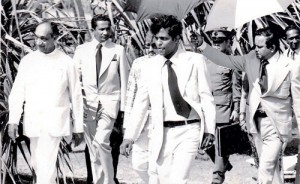Veteran hotelier steps down after long and illustrious career
A few years after the iconic Bentota Beach Hotel is constructed, a young man armed with a Canadian post-graduate tourism diploma is appointed as its assistant manager.
Ten days into the job, the 24 year-old is thrown into the deep end and asked to take over when the general manager steps down. “I was young, a rookie,” recalleds, who retired from the hotel industry last week ending a 40-year old career, stepping down as a Director/Executive Consultant at Aitken Spence Hotels as his last posting.

Bentota Beach Hotel in 1973
One of the first foreign trained tourism managers who saw the rapid transformation of the industry from the 1970s to post-war 2014, Hapugoda was the long-time general manager of Bentota Beach when it was owned by Whittall Boustead-controlled Ceylon Holiday Resorts and later when it came under John Keells (JK).
In the 1990s, after five years under JK, Hapugoda ventured out on his own to set up a successful Ayurveda resort at Bentota. In 2004, he exited the business and joined Aitken Spence Hotels as its Managing Director. The 10-year spell there saw him drive the business to new levels with the company securing management contracts in India and Oman while enhancing its Maldives operations.
Recalls former JK Group Chairman Ken Balendra under whose watch Bentota Beach was acquired by JK: “Right from the word go, Malin was a doer and outstanding throughout his career. Very knowledgeable in tourism, he moved to Aitken Spence and did a sterling job there too and is a good role model for others in the trade”
Hapugoda’s beginning was in Baddegama where his father was the Principal of Christ Church College but when seven years he joined St. Thomas College, Mount Lavinia.
“Every school vacation was spent in the village. My father in fact wanted me to go to a village school but my mother (who grew up in Pussellawa and studied at Bishops) saw the value of a good education and was persuasive enough to send my brothers and our sister to Colombo schools.”
The experience of village life and interaction helped him in the relationship between the village and Bentota Beach, and later to deal with the troubled times of the 1988 JVP insurrection when the hotel industry came to a grinding halt for a few months. “Remember hotels at the time were all outside Colombo, in remote areas and conflict with the village, if we didn’t get along, was greater.”

J.R.Jayewardene with young Malin during a 1970’s event at the hotel.
Completing the O level stream, Hapugoda was not too interested in further studies. While most of his school mates, who eventually ended up in law, medicine, public service or the planting profession, continued with their higher studies, Hapugoda spotted a newspaper advertisement seeking students for the second intake to the Ceylon Hotel School, then housed at the current Taj Samudra premises. “My father, who wanted me to do something better, objected but was convinced by my mother to give his consent to follow this course,” Hapugoda said, recalling that within three months into the course, “I was bored with washing pans an cutlery and was seeking an escape route”.
Canada bound
Nevertheless, three years later he got his degree in the company of two others, who became prominent hoteliers, Paddy Withana and U.C. Jayasinghe (both serving at Bentota Beach).
Hapugoda then took off to Canada to undergo a post graduate diploma in hotel restaurant and industrial catering at the Ryerson Institute of Technology. On his return in 1973, he joined Bentota Beach, became the youngest General Manager of a hotel and the rest is history.
Bentota was the first, organised tourism resort with land acquired by the state at a time when J.R. Jayewardene was the Minister of State in charge of tourism with Anandatissa de Alwis as his dynamic Permanent Secretary.
The architect Geofrey Bawa-designed Bentota Beach was the first property at Bentota followed by Asker Moosajee’s Hotel Serendib and Ceylon Hotels Corporation’s Hotel Lihiniya Surf.
“A few months after joining the hotel, Whittalls Chairman (M) Coomaraswamy wanted me to take over from the then manager, Fred de Saram (father of Srimani Athulathmudali). I was lucky to get this opportunity as there were no experienced people at the time.”
Hapugoda’s village roots helped to defuse many a situation in his hotel career including life-threatening moments during the 1983 riots.
“We didn’t have mobiles at the time and most land lines were dead when anti-Tamil riots exploded in 1983. I told our Tamil staff, who were boarded in village homes near the hotel, that if they felt unsafe they could stay in the hotel.”
One day preparing for a regular evening tennis game he could see Aluthgama town, a stone’s throw from the hotel, in flames.
Informed that one member of his Tamil staff was uncontactable, he got into a pickup and drove through to the home of this staff member who had however gone to Colombo in fear.
At around 6 pm, a boisterous crowd crossed the Bentota bridge and came near the hotel gate with its leader saying, “Sir, Api dannawa demala kattiya innawa athulay. Apita barathenda”. The crowd shouted “Api Sinhala dakuna kollo.”
Recalled Hapugalle, “These were tense moments. I told them, ‘Mamath dakuna Sinhala kollak’.” He told them that going into the hotel won’t solve any problems as that would chase away the few tourists around and added: “Ittapassai thamoseth badagini, apith badagini”. That changed the mood and they left. Most hotels across the island were closing down and tour operators were pulling out tourists and sending them back home.

Malin Hapugoda today
The Kandalama hotel was another huge challenge, recalled Hapugoda. Overcoming concerns from the village, the hotel has become one of the most sustainable ones in the industry with village involvement, and the most awarded for green and sustainability awards. The amenable Hapugoda has dealt with the giants in the industry over the years including the likes of Dharmasiri Senanayake, M. Sivaratnam, Balendra, Herbert Cooray and George Ondatjee among others.
Good times
While the post 1970s was a period where industry profits grew by 20 per cent a year and good dividends were paid to shareholders (Asker Moosajee once declared a 100 per cent dividend), the scene after 1983 changed and hotel managers became more cost conscious, more professional and were masters of survival.
“Survival was the keyword and we faced many challenges in promoting the product. We were constantly challenged by international media reporting how bombs were going off all the time,” he said, recalling once how a group of pro-LTTEers demonstrated in front of the Sri Lanka stand at the ITB Berlin tourism fair.
“These men came in front of the Sri Lanka stand dressed in black kits and written on it were the words in red ‘Every Deutsche Mark spent in Sri Lanka provides a bullet to kill the Tamils’. Some angry stall members wanted to confront them physically but sanity prevailed and security moved them out.”
On the service standards then and now, Hapugoda says: “Service standards may have not been professional then as it is now. However then it was more-friendly, real Sri Lankan hospitality. There was the genuine smile. Genuine hospitality (during our growing years in the profession) will eventually fade away. But that happens with growth”.
At Kandalama, the service may not be as good as a typical Colombo 5-star offering but it makes up for warmth and sincerity from the staff many of who come from nearby villages.
Warm service standards missing
Veteran lawyer K. Kanag Isvaran shares the view that missing in today service delivery is the ubiquitous Sri Lanka smile and natural welcome.
“That old world charm that was evident during Malin’s days is gone. The service is more mechanical and we have to address young staff as ‘Putha’ to get their attention, even when they come into the hotel room, place flowers on the bed and rush away. Those days they would chat and talk. This is missing today with profit, not service, being the motive,” he said adding that, as a director at the then Ceylon Hotel Resorts before the JK acquisition, he found Hapugoda to be very forward thinking and progressive unlike the other young managers
“He made lots of suggestions, had excellent staff and guest relations with the hallmark at the Bentota Beach being highly personalised services with that Sri Lankan smile,” he said.
Having experienced the birth, growth and crises in the industry, Hapugoda and his wife plans to spend more time with their daughter’s family in the US.
The veteran hotelier believes Sri Lanka missed the bus in the post-2009 era in developing strong, aggressive branding to project a country that says “the war is over ….these are our attractions”.
He said: “The authorities wrongly felt at the time that with the war over, everyone will start coming. What has happened now is that the same segment that came during the war, are visiting, now in larger numbers. There is 15-17 per cent growth year on year but yields are not increasing as the market segment is the same. We are not attracting the discerning traveller”.
Hapugoda shares the view of many veterans in the industry that Sri Lanka tourism cannot grow on numbers alone since this is a small, high density population and weak infrastructure.
“If we are to grow we must grow our niche products, high yielding returns with at least 40 per cent of total arrivals making up this segment,” he says.
| Tryst with the revolutionary JVP Dressed in casual jeans, shirt and rubber sleepers, Malin Hapugoda rests nonchalantly against the tea kade wooden pillar, lights a cigarette from the ‘kambe’ (smoking rope) and watches from the side of his right eye the man near the Ambalangoda bus halt. Like the pages from a novel, he then gets into his Hiace van, drives towards the young man and asks him to get it. “I didn’t know what I was getting in,” Hapugoda says, laughing now at those troubled moments when one wrong move could have ended in disaster. This was in 1988/89 at the height of the JVP insurrection where, like many hotel executives, Hapugoda was under threat for violating a JVP “chit” diktat to close hotels. Once in Colombo, he was urged by hotel executives to be cautious. Calling a surveyor friend of my father in Baddegama who was familiar with the JVP hierarchy in the village, he asked him to clarify the threat. Three days later, he was told that the JVP Galle Balakaya wanted to meet him. “The meeting point was the Ambalangoda bus stand where I was asked to meet this young man,” Hapugoda recalled. They drove to the Ambalangoda Rest House where Hapugoda offered a beer to his guest who declined saying “Api bonne naha.” The JVP, as the veteran hotelier discovered during that conversation, had been furious with Hapugoda for not only keeping the hotel open but also, at the request of the Tourist Board in Colombo, urging other hotels in the area too, to be kept open. “I told that if hotels are closed it’s the staff, not the owners, who would suffer. They won’t have food to eat, look after their families and harming me is not going to solve the problem. Even if I am removed, the military would take over the hotels and that would be a bigger problem for you,” he said, adding that he then engaged the young man in a discussion on the Russian and French revolutions. “We got into an intellect conversation,” he recalled. A few days later, the surveyor called him and said that he was safe and that the JVP had been so impressed that they wanted Hapugoda to join the movement! It was only then that Hapugoda related the incident to his wife. |


